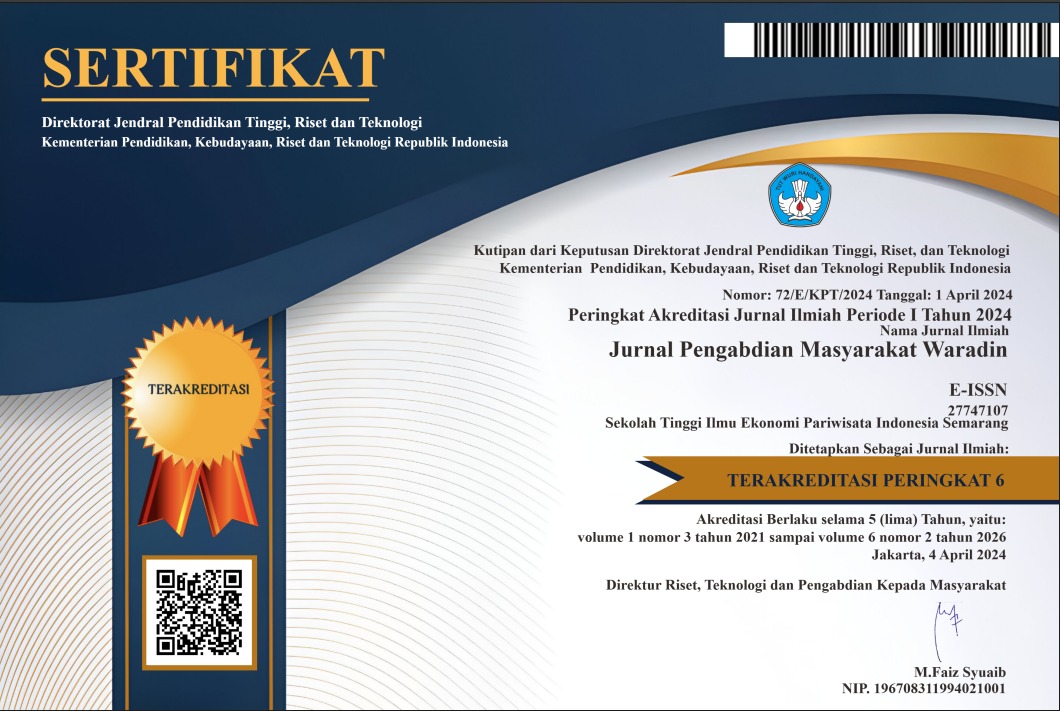Penguatan Literasi Perkembangan Anak Usia Dini bagi Pengasuh Daycare di Posyandu Mawar Desa Tampingan Kabupaten Kendal
DOI:
https://doi.org/10.56910/wrd.v5i3.826Keywords:
Child development, Developmental stimulation, Educational programs, Parenting literacy, Role of caregiversAbstract
Improving caregiver literacy regarding early childhood development is a strategic step to ensure optimal child growth and development. This educational activity was conducted at the Mawar Integrated Health Post (Posyandu Mawar), Tampingan Village, Boja District, involving 20 caregivers as active participants. The series of activities were systematically arranged, including a pre-test to determine the level of initial understanding, counseling through a lecture method accompanied by comprehensive material delivery, interactive discussions that allowed participants to exchange experiences, practice of child development stimulation as a form of direct skills, and a post-test to assess improvements in learning outcomes. The analysis results showed that the educational activity had a significant impact on improving caregiver literacy. The average pre-test score of 53.25 (SD = 9.54) increased to 69.60 (SD = 10.30) in the post-test. The average difference of 16.35 (SD = 5.84) with a 95% confidence interval between 13.62–19.08 indicated a significant increase. The paired t-test yielded a value of t(19) = 12.515 with p < 0.05, confirming a significant difference between the scores before and after the program. The percentage increase of 30.7% indicates the effectiveness of the applied educational method. The recommendation from this activity is the need to develop an educational program that is carried out in a sustainable and structured manner, accompanied by mentoring involving health workers, PAUD educators, and support from the village government, so that caregiver literacy can continue to increase and optimal child growth and development can be guaranteed from an early age.
References
Andrina, M., & SMERU Research Institute. (2021). Maternal employment and childcare arrangements in Indonesia: The needs for childcare support policies. Masyarakat Indonesia, 48(2). https://doi.org/10.14203/jmi.v48i2.1244
Author, A., Author, B., & Author, C. (2024). Caregiver education, home stimulation, and child development outcomes in low- and middle-income countries. International Journal of Early Childhood, 56(2), 145–163. https://doi.org/10.1007/s13158-024-00398-x
Baskoro, B. D., Mat Radzi, R., & Dahalan, N. (2023). Entrepreneurial orientation, psychological capital, entrepreneurial strategy, and firm performance on private daycare in Indonesia: A conceptual paper. International Journal of Academic Research in Business and Social Sciences, 13(7), 1–15. https://doi.org/10.6007/IJARBSS/v13-i7/17180
Black, M. M., Walker, S. P., Fernald, L. C. H., Andersen, C. T., DiGirolamo, A. M., Lu, C., … & Grantham-McGregor, S. (2017). Early childhood development coming of age: Science through the life course. The Lancet, 389(10064), 77–90. https://doi.org/10.1016/S0140-6736(16)31389-7
Britto, P. R., Lye, S. J., Proulx, K., Yousafzai, A. K., Matthews, S. G., Vaivada, T., … & Early Childhood Development Interventions Review Group. (2017). Nurturing care: Promoting early childhood development. The Lancet, 389(10064), 91–102. https://doi.org/10.1016/S0140-6736(16)31390-3
Budyawati, L. P. I., Atika, A. N., Umami, Y. S., Haidlor, M., & Afandi, A. (2022). Working parents’ needs for early childhood daycare. Jurnal Pendidikan Anak Usia Dini Undiksha, 11(2). https://doi.org/10.23887/paud.v11i2.54883
Desa Tampingan. (2025, March 22). Profil Desa Tampingan. Kendal Kab. https://tampingan.kendalkab.go.id/profile
International Journal of Public Health. (2025). Caregiver-child interaction and early child development in rural China: The mediating role of socioeconomic status. International Journal of Public Health. https://pubmed.ncbi.nlm.nih.gov/38880881/
Jeong, J., Franchett, E. E., Ramos de Oliveira, C. V., Rehmani, K., & Yousafzai, A. K. (2021). Parenting interventions to promote early child development in the first three years of life: A global systematic review and meta-analysis. PLoS Medicine, 18(5), e1003602. https://doi.org/10.1371/journal.pmed.1003602
Sa’diyah, R., Lestari, N. P., & Nuraeni, L. (2024). Peran pengasuh dalam menstimulasi perkembangan sosial emosional anak usia dini di Kabupaten Cianjur. FamilyEdu: Jurnal Pendidikan Kesejahteraan Keluarga, 3(1), 12–21. https://ejournal.upi.edu/index.php/familyedu/article/view/83179
Said, M., Bakar, M., Ali, A., & Haji, A. (2022). Caregiver knowledge on dietary diversity and early stimulation at home and its relationship with child development outcomes in Zanzibar. BMC Public Health, 22(1), 456. https://doi.org/10.1186/s12889-022-13009-y
Shrestha, M., Fang, J., & Dahal, S. (2019). Parental knowledge and practice on child development: A community-based study in Nepal. Journal of Nepal Health Research Council, 17(2), 161–167. https://doi.org/10.33314/jnhrc.v17i2.1480
Sukarjo, D. H., Putra, F. P., & Widyatami, F. S. (2024). Analisis kelayakan investasi pada proyek perumahan Mahardika Residence sesuai analisis biaya dan analisis permintaan. Jurnal Teknik dan Teknologi Terapan, 2(1), 11–20. https://doi.org/10.47970/jttt.v2i1.624
Suprapto, U., Stei, B., Cipta, M., Karawang, I., & Saftarijan, H. (2024). Bisnis daycare dalam perspektif ekonomi Islam (Studi kasus di Daycare Sahabat Teladan). Ad-Deenar: Jurnal Ekonomi dan Bisnis Islam. [Lengkapi volume, issue, & halaman bila tersedia]
Tatminingsih, S. (2021). The type of childcare for working mothers in Indonesia. JPUD: Jurnal Pendidikan Usia Dini, 16(2), 1–15. https://doi.org/10.21009/JPUD.162.01







